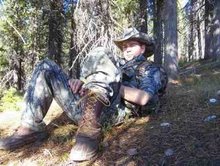Conservation Force Press Release
 PRESS RELEASE
PRESS RELEASE
On Friday, June 1, 2007 the United States Fish & Wildlife Service (USF&WS) published in the Federal Register its positions for the 14th COP of CITES, 72FR30606. There are three (3) alarming surprises for the world hunting community. The USF&WS is opposing the proposed leopard quota for Uganda, the increase in the leopard quota for Mozambique from 60 to 120 and is undecided on Kenya’s proposal to withdraw the black rhino quotas of Namibia and South Africa (5 each.)
The USF&Ws states in the Notice that neither Uganda nor Mozambique have demonstrated an adequate scientific basis to support their leopard quota requests. Not “enough biological information about the populations of leopard or their prey” has been provided.
John Jackson, Chairman of Conservation Force, said, “Uganda’s quota requestis a nominal 28. Uganda has little hope of establishing a viable tourist hunting basewithout the quota. The suggestion that more information is necessary to demonstratethat the quota would not be detrimental is absurd and reflects more on the challenger,the USF&WS, then on the documentation. Unfortunately the opposition suggests the U.S. will not accept the quota or allow the import of leopard from Uganda regardless of any COP adopted quotas. It is another case of over-regulation by the International Office of the USF&WS.
Mozambique is seeking to increase its quota from 60 to 120 which would still be one of the lowest quotas of any country quota. That increase is absolutely necessary to provide for export from new “expanding destinations in Mozambique, particularly the 11 million acre Niassa Reserve. Without the increase there will not be any export permits for Niassa which makes safari hunting there highly untenable.
The U.S. suggestion that there is any merit to Kenya’s attack on the Rhino quotas adopted at COP13 is troubling. The very idea that the taking of five rhino could be detrimental is once again more reflective on International Office of the USF&WS than on the biology and management of black rhino that are well managed and increasing in numbers.
The opposition is the epitome of bureaucracy. All three quotas are too small to be of account. One would like to think that the U.S. is just unnecessarily harking for high standards, but its past and present practices demonstrate a growing attitude against tourist hunting. If the U.S. prevails in its opposition to the leopard quotas, those two countries will have to renew their request at the next COP in three (3) years.
For more information contact John J. Jackson, III, Chairman of Conservation Force, JJW-NO@att.net or 504-837-1233.
Conservation Force Website
